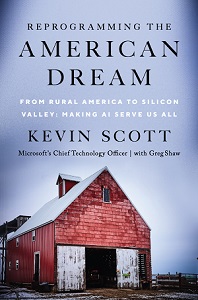Reprogramming the American Dream: From Rural America to Silicon Valley — Making AI Serve Us All By Kevin Scott with Greg Shaw, New York: HarperCollins, 2020, 285 pages
Kevin Scott grew up in the rural town of Gladys, Va., amid an economy that was still dominated by tobacco farming, textile manufacturing, and furniture production. He recalls that "even as a kid I could see the bitter end of an economy that used to hum along, and I couldn't wait to chase my own dreams of building computers and software." His journey took him all around the globe, and after successful engineering stints at Google and LinkedIn, he now serves as chief technology officer at Microsoft, where he spends much of his time focusing on artificial intelligence (AI).
To say that Scott is an optimist would be something of an understatement. In Reprogramming the American Dream, Scott lays out an extremely hopeful vision for AI. In his view, the technology can create abundance and opportunity for everyone, provided that our society takes a principled and egalitarian approach to its development. This is not to say that Scott fails to recognize AI's potential problems. Rather, he recognizes the pitfalls but firmly believes they can be overcome.
Scott attempts to counter some of the prevailing stories about AI — both utopian and dystopian — with what he sees as a more nuanced portrait of the technology's current uses and potential. He confines most of his analysis to "narrow" AI — those applications focused on solving specific, well-defined problems. Although he tips his hat toward the concerns of Stephen Hawking and others that AI may eventually pose an existential threat to mankind, he mostly focuses on the workaday world of AI in its current industrial manifestations.
Much of AI is used to automate processes, and so discussions of AI often revolve around the themes associated with automation — both the technology's potential to improve productivity and its potential to replace jobs. Here, Scott recognizes that automation does replace jobs but emphasizes that this process frees up labor for other, potentially more fulfilling, tasks.
When it comes to the education and training necessary to prepare workers for the economy's new jobs, Scott points to local solutions. In particular, he tells the story of a partnership between a private firm and a local government in rural Iowa. The private firm established an office to train young software engineers, and the local citizenry passed a $35 million bond to finance a new high school and adjacent community college that will jointly operate a career academy to train workers for the high-tech jobs of tomorrow.
Those new jobs are likely to be abundant, in Scott's estimation, because AI can actually be highly labor intensive — at least in its implementation stage. This observation seems particularly germane to the AI subfield of machine learning, which has played a large role in Scott's career. With machine learning, computer algorithms are trained using sample data to recognize patterns and draw inferences. It turns out that the design and training of these systems takes a lot of human input — as does the infrastructure supporting these projects.
Scott still feels a strong connection to his rural roots, and it is his fervent hope that AI can stimulate the rebirth of the rural economy. Here, one of his chosen models is Germany's highly successful Mittelstand sector, in which small- and medium-sized firms leverage automation to make leading products in narrow vertical markets. In his view, AI creates efficiencies that make it easier than ever to design, manufacture, and market innovative products. As a U.S. example of such endeavors, he cites Warby Parker. He also emphasizes AI's potential to spur rural growth in agriculture, where smart systems can optimize the delivery of water, fertilizer, and pesticides.
Scott's policy views are perhaps not so uncommon for a U.S. technology entrepreneur. He conveys a belief in the efficiency of markets, and he cautions against the unintended effects of well-intentioned policies, such as minimum wage laws and taxes on AI robots. But he also favors a strong social safety net and substantial public investments in education and infrastructure — rural broadband connectivity, in particular.
Rather than emphasizing particular political solutions, Scott sets out a set of general principles for the AI industry. Chief among these is the egalitarian goal that "we must ensure that anyone — ideally, everyone — can participate" in AI's development and governance. He also favors the adoption of a formal code of ethics for the AI industry, similar to ones found in the legal and medical professions. For AI experts, his advice is to "put your work in context" and to think about how it is "impacting your fellow human beings." For technology developers, he offers the dictum, "It's not great AI if it's unethical AI." Although some readers may tire of such generalities, it is hard not to be buoyed by his optimism about AI's potential to help solve some of humanity's most pressing problems.




